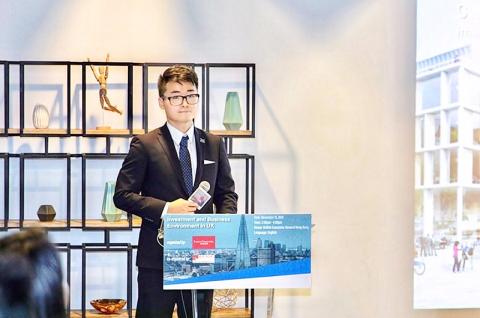Simon Cheng (鄭文傑), a Hong Konger who was detained by China in August while employed by the British consulate in Hong Kong, on Saturday said that he had been followed by an “unknown person” while visiting Taiwan.
Cheng, who was in Taiwan from Aug. 30 to Nov. 29, on Saturday told the Liberty Times (the Taipei Times’ sister newspaper) that someone had begun following him after he told foreign media in Taipei about how he was tortured during his 15 days in detention in China.
The experience made him worry about his safety, but he remained confident in the Taiwanese government’s abilities, he said.

Screen grab from Simon Cheng’s Facebook account
The Ministry of Foreign Affairs said that the British Office Taipei had warned it that he would be interviewed in the city.
While at Eslite Bookstore in Taipei’s Xinyi District (信義) Cheng noticed he was being followed by a middle-aged man who he had seen a few hours earlier at the nearby Xiangti Avenue Plaza, he said, adding that the man had changed his clothing.
While in the bookstore, the man — whose identity and intentions he was unsure of — was watching him while pretending to read, Cheng said.
He said that after being notified about the issue, the government arranged for bodyguards to stay with him.
Police said initial investigations found that the man was not Taiwanese and did not appear to be associated with any local pro-China group.
In interviews with the BBC and the Washington Post published on Nov. 20, Cheng said that he had been tortured by Chinese police to extort a confession.
“They wanted to know what role the UK had in the Hong Kong protests — they asked what support, money and equipment we were giving to the protesters,” he told the BBC.
Chinese police told him during his interrogation that many Hong Kong protesters who had been arrested were sent to China where they were being detained, Cheng told the Liberty Times.
British Secretary of State for Foreign and Commonwealth Affairs Dominic Raab had summoned Chinese Ambassador to Britain Liu Xiaoming (劉曉明) over Cheng’s arrest and torture.
Liu has said the Hong Kong protests have “nothing to do with democracy,” and that Beijing never asked Hong Kong to change its laws.
Cheng said that the British government has canceled his contract out of concerns for his safety, as the job requires frequent travel to China.
There was also concern that his enthusiasm for discussing the Hong Kong’s government’s policies and the territory’s ongoing democracy movement were in conflict with the principle of neutrality that public officials normally adhere to, he said.
The UK government gave him a two-year working holiday visa, but he is in talks to secure permanent residence or citizenship, Cheng said, adding that he is also looking for a job with the UK parliament or a think tank.
He also plans to visit the US and countries in Europe to secure support in the defense of Hong Kong’s freedom and Taiwan’s democracy, he said.
Cheng said he feels safer in the UK than he did in Taiwan, but that he also loves Taiwan because he graduated from National Taiwan University, which changed the course of his life.
He plans to visit Taiwan often, he added.

Alain Robert, known as the "French Spider-Man," praised Alex Honnold as exceptionally well-prepared after the US climber completed a free solo ascent of Taipei 101 yesterday. Robert said Honnold's ascent of the 508m-tall skyscraper in just more than one-and-a-half hours without using safety ropes or equipment was a remarkable achievement. "This is my life," he said in an interview conducted in French, adding that he liked the feeling of being "on the edge of danger." The 63-year-old Frenchman climbed Taipei 101 using ropes in December 2004, taking about four hours to reach the top. On a one-to-10 scale of difficulty, Robert said Taipei 101

Nipah virus infection is to be officially listed as a category 5 notifiable infectious disease in Taiwan in March, while clinical treatment guidelines are being formulated, the Centers for Disease Control (CDC) said yesterday. With Nipah infections being reported in other countries and considering its relatively high fatality rate, the centers on Jan. 16 announced that it would be listed as a notifiable infectious disease to bolster the nation’s systematic early warning system and increase public awareness, the CDC said. Bangladesh reported four fatal cases last year in separate districts, with three linked to raw date palm sap consumption, CDC Epidemic Intelligence

Taiwanese and US defense groups are collaborating to introduce deployable, semi-autonomous manufacturing systems for drones and components in a boost to the nation’s supply chain resilience. Taiwan’s G-Tech Optroelectronics Corp subsidiary GTOC and the US’ Aerkomm Inc on Friday announced an agreement with fellow US-based Firestorm Lab to adopt the latter’s xCell, a technology featuring 3D printers fitted in 6.1m container units. The systems enable aerial platforms and parts to be produced in high volumes from dispersed nodes capable of rapid redeployment, to minimize the risk of enemy strikes and to meet field requirements, they said. Firestorm chief technology officer Ian Muceus said

MORE FALL: An investigation into one of Xi’s key cronies, part of a broader ‘anti-corruption’ drive, indicates that he might have a deep distrust in the military, an expert said China’s latest military purge underscores systemic risks in its shift from collective leadership to sole rule under Chinese President Xi Jinping (習近平), and could disrupt its chain of command and military capabilities, a national security official said yesterday. If decisionmaking within the Chinese Communist Party has become “irrational” under one-man rule, the Taiwan Strait and the regional situation must be approached with extreme caution, given unforeseen risks, they added. The anonymous official made the remarks as China’s Central Military Commission Vice Chairman Zhang Youxia (張又俠) and Joint Staff Department Chief of Staff Liu Zhenli (劉振立) were reportedly being investigated for suspected “serious